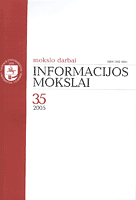Socialinių duomenų archyvai: Lietuvos informacinės infrastruktūros trūkstamas sandas
Social sciences data archives: a missing component in Lithuanian research information infrastucture
Author(s): Audronė Glosienė, Algis Krupavičius, Ramunė PetuchovaitėSubject(s): Economy
Published by: Vilniaus Universiteto Leidykla
Summary/Abstract: Research is one of the strong forces encouraging societal development. Research education, and innovation make a knowledge triangle, a basis of a modern knowledge society. Now in Europe one can follow increasing political interest in research infrastructures, including development of the infrastructure for the Social Sciences and Humanities (SSH). In order to support coherent policy making on research infrastructures in Europe The European Strategy Forum on Research Infrastructures (ESFRI) was launched in 2002. ESFRI functions as the strategic forum aiming at creating Roadmap for Research Infrastructures of Pan-European interest for the next 10–20 years. Three steering groups on Physical Sciences and Engineering, Biological and Medical sciences, and Social Sciences and Humanities operate within the structure of the ESFRI. Although Lithuania is fully represented in ESFRI, we still lack clear research policies, national guidelines for research infrastructures development, especially in the field of SSH. Moreover, in Lithuanian SSH research infrastructures there is a gap regarding research data archives. This article aims to analyze the models and new trends of modern research infrastructures in the SSH, as well as to draw recommendations for development of SSH infrastructures in Lithuania. So the article presents a review of literature, resources and knowledge acquired during the visits by members of the group for Lithuanian SSH development strategy, created by the Ministry of Education and Research, to SSH data archives and research administration bodies in Norway, Finland, Germany, the Netherlands, etc. Research infrastructures could be defined as facilities, equipment, services and other resources required for successful functioning of the research community in both academic and/or industrial domains. Hence, broadly defined research infrastructures include human, institutional, tangible and informational resources needed for successful research activities, facilitating effectiveness of an individual research and collaborative (group-based) research. There might be many definitions of research infrastructures depending on the scientific disciplines and fields; however in this article we use a model proposed by Johnson (1997) stating that research Infrastructures are built of four major components – information infrastructure, communication infrastructure, technological infrastructure and social infrastructure. Though SSH research infrastructures may be analyzed applying general model, we argue that it differs to some extent from the other fields of science, mainly from physical, technological, medical and related fields. Data and information is the main material in Social Sciences and Humanities, but for modern studies accessibility, networking, standardized data structures, context and methodologies are of a key importance.
Journal: Informacijos mokslai
- Issue Year: 2005
- Issue No: 35
- Page Range: 9-31
- Page Count: 23
- Language: Lithuanian

